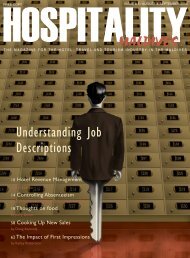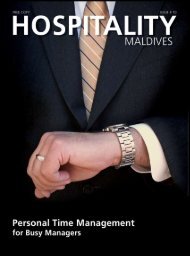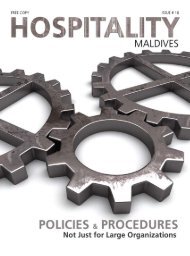Don't Let Your Systems Drive Your Customers Crazy! - Hospitality ...
Don't Let Your Systems Drive Your Customers Crazy! - Hospitality ...
Don't Let Your Systems Drive Your Customers Crazy! - Hospitality ...
Create successful ePaper yourself
Turn your PDF publications into a flip-book with our unique Google optimized e-Paper software.
SERVICE<br />
At least when the term valet was extended to ‘dumb valet,’<br />
that furniture item upon which one lays out clothing for the following<br />
day, there was no pretence that this was the real item. Fortunately<br />
for the profession, the public were not fooled or taken<br />
in by these ‘dumb butlers’ and the practice has faded relatively<br />
rapidly-hopefully before it soured guests on the value of being<br />
serviced by (real) butlers in hotels. And fortunately so for the<br />
butlers working in top hotels around the world, who do justice to<br />
the profession, and the hotel managements who have recognized<br />
the value butlers bring to the bottom line and the repute of word<br />
of mouth for their establishments.<br />
In an industry that is completely premised on the idea of service,<br />
and in which service is a key differentiator, it’s a no-brainer<br />
to institute butler service. Butlers have always represented the<br />
pinnacle in service quality. After the initial required training, the<br />
running of a butler service is not much more expensive to provide<br />
than regular service, yet it allows rack rates to be raised and<br />
creates a loyal following of repeat visitors, as well as enhancing<br />
word of mouth and thus new business that make the investment<br />
most sound.<br />
Instituting butler service can be done gradually, perhaps instituting<br />
it on one floor, and at not such a great cost, especially<br />
when considering the return on investment. Fifteen rooms can be<br />
well serviced by four butlers on three shifts, for instance, with one<br />
of them assigned as Head butler. If service is to be 24-hour, then<br />
a fifth butler would be needed.<br />
Assuming an owner or manager decides to institute butler<br />
service, the next question is, ‘How?’<br />
The first step is to bring on board the most service-minded<br />
of your employees to undergo training. The second: Bring in one<br />
of the handful of<br />
butler trainers who<br />
can train hotel<br />
butlers (as distinct<br />
from butlers in private<br />
residence, as<br />
the hotel environment<br />
is very different<br />
and requires<br />
fewer and different<br />
skills than the<br />
traditional butler).<br />
In putting together a training program, it is important to<br />
know the four main elements that hotel butler trainees and hotel<br />
butler programs need in order to succeed.<br />
First of all, there are the mechanical actions, the skills that<br />
butlers need, such as how to clean shoes, how to greet guests and<br />
tour them around their suite, how to arrange events for their stay,<br />
how to draw baths, pack suitcases, etc.<br />
Then there is knowing and adopting as second nature the<br />
psyche or mindset of the butler. In order to do something effectively<br />
and with conviction, one has to be able to be the role that<br />
one is playing fully. This is obvious when watching a great actor<br />
in a movie. But it is also true in life, too. Unless a trainee butler<br />
has the right demeanor, attitude and approach as a starting point,<br />
he or she will never be able to carry off the role convincingly or<br />
handle guests and even fellow staff with the aplomb that makes<br />
butlers such quintessential service professionals.<br />
This is why the training has to include the history, rationale,<br />
characteristics and communication skills of the traditional butler,<br />
and enough drilling-in of these elements so that when the novice<br />
butler is faced with a tricky or embarrassing situation, he or she<br />
is not left tongue-tied, upsetting guests, or proving that he is not<br />
the smooth, low-key character that guests expect in their butlers.<br />
When friendly American hospitality employees chatter endlessly<br />
and over-familiarly with guests and follow mantras about always<br />
greeting the guest by name at least three times within so many<br />
minutes, they are presenting ingrained training patterns that do<br />
not add up to the butler experience. This is not to say that the<br />
butler is not friendly, but there are other ways of expressing it<br />
than by well-worn phrases and compulsive chatter.<br />
Thirdly, having covered the theory and done copious drills<br />
on applying the skills in a classroom environment, the trainer<br />
needs to move out with the butlers and expose them gradually to<br />
guests in the actual areas they will be providing butler service. By<br />
this is meant that trainees use each other and then senior staff as<br />
guest guinea-pigs, and they then service known-to-be-easy guests,<br />
and finally are allowed to service VIPs and known-to-be-difficult<br />
guests. The trainer should correct them on an internship or<br />
apprenticeship basis until the trainees can confidently do their<br />
duties.<br />
Finally, for training to be practical and workable, it needs to<br />
tie the general actions of butling into the specific hotel environment<br />
in which they are working. This means the trainer has to<br />
work with hotel management and butler trainees to adapt existing<br />
SOPs (standard operating procedures) and propose new ones<br />
that align with existing SOPs.<br />
It is workable to develop such SOPs during the early training<br />
steps and then drill them and correct them as needed during the<br />
apprenticeship period, fine-tuning against the hotel environment<br />
until they are smooth and effective. The result is best compiled<br />
into a butler manual that can be referred to as needed by the<br />
butlers, and which can also be used to train more butlers. The<br />
program will probably<br />
“ …building a whole new hotel at $1.5<br />
million per-room-cost just to be able<br />
to expand on the butler service pilot<br />
he had run.’’<br />
expand based on the<br />
successes of the initial<br />
pilot. That has certainly<br />
been the experience to<br />
date-one owner even<br />
building a whole new<br />
hotel at $1.5 million<br />
per-room-cost just to<br />
be able to expand on<br />
the butler service pilot<br />
he had run.<br />
It is also possible that there will be some attrition or turnover,<br />
but to date, hotel butlers that have been trained as above<br />
have proven happy enough with their situation to politely decline<br />
the inevitable offers from guests to return home with them and<br />
run their private households or yachts.<br />
The end result of the whole program as outlined above is<br />
generally employees with high morale who competently carry<br />
out their duties, wowing guests and resulting, as stated before, in<br />
higher-than-usual occupancy, a high rate of return visits, and the<br />
opportunity to increase rack rates while enjoying stellar word of<br />
mouth.<br />
Perhaps it would be better to ask then, not what the butler<br />
did, but what he (or she) could do for your hotel.<br />
This article was originally published by hotelexecutive.com.<br />
Professor Steven Ferry trains butlers in hotels, resorts, and private estates, and spa<br />
butlers in spas. He is Chairman of the International Institute of Modern Butlers<br />
(www.modernbutlers.com) and author of the best-selling industry texts, Hotel Butlers,<br />
The Great Service Differentiators and Butlers and Household Managers, 21st Century<br />
Professionals. He can be contacted at stevenferry@modernbutlers.com.<br />
HOSPITALITY MALDIVES OCTOBER/NOVEMBER 2006 41

















